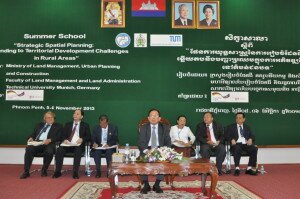6 November 2013
The end of the two-day International Summer School in Phnom Penh welcomed many satisfied faces, and all voiced positive feedback.
The Summer School took place from 5-6 November 2013. It is organized every year by the Ministry of Land Management, Urban Planning and Construction, the Royal University of Agriculture – Faculty of Land Management and the Technical University Munich; supported by GIZ Land Rights Programme.
This year’s Summer School was chaired by H.E. Im Chhun Lim, Senior Minister of Land Management, Urban Planning and Construction. It focused on the topic, “Strategic Spatial Planning: Responding to Territorial Development Challenges in Rural Areas”. About 22 high quality speeches and presentations of national and international experts from Lao PDR, the Philippines, the Socialist Republic of Vietnam and Germany provided a strong foundation for further discussions with panelists and the audience.

The picture shows H.E. Im Chhun Lim, Senior Minister Land Management, Urban Planning and Construction (in front). From left: Dr. Franz-Volker Müller, Program Manager GIZ Land Rights Program; H.E. Pen Sophal, Secretary of State; H.E. Lim Voan, Secretary of State; H.E. Ou Vuddy, Secretary of State; H.E. Sar Sovann, Secretary of State; H.E. Seak Vanna, Undersecretary of State.
Discussions touched upon some of the most important topics for developing and emerging countries: How to mitigate the rural-urban migration? How to avoid the rural exodus? How to strengthen rural areas in terms of social and physical needs of the population? How to create jobs in rural areas and transform dormant rural towns to lively rural centers? And, what role does comprehensive spatial planning play to respond to these various challenges mentioned above?
In order to respond to these challenges, participatory planning activities are of utmost importance. However, coordination, cooperation and communication among all stakeholders are necessary preconditions. The role of all stakeholders must be clarified and they should actively take part and contribute to the common objective. In his summary, Prof. EoE Holger Magel remarked, “It’s all about People and Land!”
The Summer School was attended by more than 150 persons from national and sub- national government institutions, international experts, NGOs, students and representatives of the private sector.
